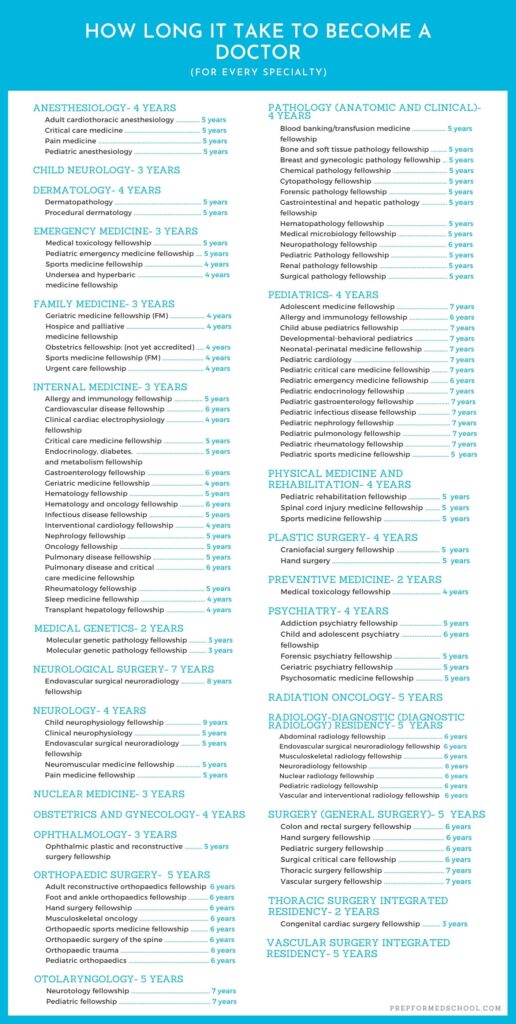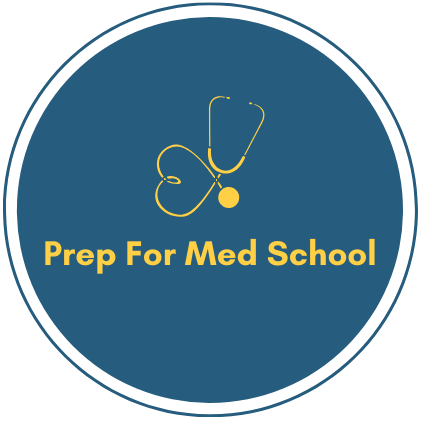So you want to be a doctor? Watching enough Grey’s Anatomy or House can get you hyped to become a doctor. It seems scrubs and white coats have never been more attractive. But before you can be on the floor running to coding patients, you have to slough through years of training, practicing on cadavers and mannequins first.
Just how long does it take to be a doctor? Well, “doctor” is pretty broad. Depending on what specialty you want to practice, the amount of training you go through can vary. The general path in the U.S. includes:
| A Snapshot of Physician Training | ||
| Training | Years | Exams |
| Undergraduate School | 4 | MCAT |
| Medical School | 4 | Step 1, Step 2, Shelfs |
| Residency | 3 – 7 | Step 3, Inservice Exam, Board Certification |
| Fellowship | 1 – 3 | Board Certification |
Time spent in undergraduate and medical school is consistent (already 8 years in total). The difference in time lies in the residency and fellowship, which varies by specialty. The total amount of time it’ll take to become a doctor ranges from 11 years to 18 years, depending on the specialty. This is the time from college until you are completely done with training.
In this article, we’re going to dissect what this decade long journey consists of–by specialty! Each specialty comes with its own subspecialties as well, so we’re going to cover all that here.
If you are in a hurry, we have quickly compiled all the necessary and relevant information for each specialty in this neat chart below.
Length to Become a Doctor Chart With Median Salary And Hours Worked Information
Average Length of Training |
Average Hours/Weeks |
Average Weeks/Year |
Median Salary |
|
|---|---|---|---|---|
| Anesthesiology | 4 years | 61 hrs | 45.50 weeks | $404,000 – $414,000 |
| Adult cardiothoracic anesthesiology | 5 years | |||
| Critical care medicine | 5 years | |||
| Pain medicine | 5 years | |||
| Pediatric anesthesiology | 5 years | |||
| Child Neurology | 3 years | – | – | $189,,000 – $281,000 |
| Dermatology | 4 years | 45.40 hrs | 45.70 weeks | $299,000 – $420,000 |
| Dermatopathology | 5 years | |||
| Procedural dermatology | 5 years | |||
| Emergency Medicine | 3 years | 46.40 hrs | 47.70 weeks | $290,000 – $382,000 |
| Medical toxicology fellowship | 5 years | |||
| Pediatric emergency medicine fellowship | 5 years | |||
| Sports medicine fellowship | 4 years | |||
| Undersea and hyperbaric medicine fellowship | 4 years | |||
| Family Medicine | 3 years | 52.60 hrs | 47.60 weeks | $207,000 – $239,000 |
| Geriatric medicine fellowship (FM) | 4 years | |||
| Hospice and palliative medicine fellowship | 4 years | |||
| Obstetrics fellowship: (not yet accredited) | 4 years | |||
| Sports medicine fellowship (FM) | 4 years | |||
| Urgent care fellowship | 4 years | |||
| Internal Medicine | 3 years | 54.90 hrs | 47.70 weeks | $218,000 – $264,000 |
| Allergy and immunology fellowship | 5 years | |||
| Cardiovascular disease fellowship | 6 years | |||
| Clinical cardiac electrophysiology fellowship | 4 years | |||
| Critical care medicine fellowship | 5 years | |||
| Endocrinology, diabetes, and metabolism fellowship | 5 years | |||
| Gastroenterology fellowship | 6 years | |||
| Geriatric medicine fellowship | 4 years | |||
| Hematology fellowship | 5 years | |||
| Hematology and oncology fellowship | 6 years | |||
| Infectious disease fellowship | 5 years | |||
| Interventional cardiology fellowship | 4 years | |||
| Nephrology fellowship | 5 years | |||
| Oncology fellowship | 5 years | |||
| Pulmonary disease fellowship | 5 years | |||
| Pulmonary disease and critical care medicine fellowship | 6 years | |||
| Rheumatology fellowship | 5 years | |||
| Sleep medicine fellowship | 4 years | |||
| Transplant hepatology fellowship | 4 years | |||
| Medical Genetics | 2 years | – | – | $161,000 – $221,000 |
| Molecular genetic pathology fellowship | 3 years | |||
| Molecular genetic pathology fellowship | 3 years | |||
| Neurological Surgery | 7 yrs | 58.2 hrs | – | $569,000 – $700,000 |
| Endovascular surgical neuroradiology fellowship | 8 years | |||
| Neurology | 4 years | 50.8 hrs | 45.90 weeks | $217,000 – $317,000 |
| Child neurophysiology fellowship | 9 years | |||
| Clinical neurophysiology | 5 years | |||
| Endovascular surgical neuroradiology fellowship | 5 years | |||
| Neuromuscular medicine fellowship | 5 years | |||
| Pain medicine fellowship | 5 years | |||
| Nuclear Medicine | 3 years | – | – | $312,000 – $369,000 |
| Obstetrics and Gynecology | 4 years | 58 hrs | 47 weeks | $265,000 – $318,000 |
| Ophthalmology | 3 years | 51 hrs | 47 weeks | $263,000 – $349,000 |
| Ophthalmic plastic and reconstructive surgery fellowship | 5 years | |||
| Orthopaedic Surgery | 5 years | 57 hrs | 47 weeks | $464,000 – $612,000 |
| Adult reconstructive orthopaedics fellowship | 6 years | |||
| Foot and ankle orthopaedics fellowship | 6 years | |||
| Hand surgery fellowship | 6 years | |||
| Musculoskeletal oncology | 6 years | |||
| Orthopaedic sports medicine fellowship | 6 years | |||
| Orthopaedic surgery of the spine | 6 years | |||
| Orthopaedic trauma | 6 years | |||
| Pediatric orthopaedics | 6 years | |||
| Otolaryngology | 5 years | 53.1 hrs | 48 weeks | $335,000 – $450,000 |
| Neurotology fellowship | 7 years | |||
| Pediatric fellowship | 7 years | |||
| Pathology (Anatomic and Clinical) | 4 years | – | 47.10 weeks | $223,000 – $297,000 |
| Blood banking/transfusion medicine fellowship | 5 years | |||
| Bone and soft tissue pathology fellowship | 5 years | |||
| Breast and gynecologic pathology fellowship | 5 years | |||
| Chemical pathology fellowship | 5 years | |||
| Cytopathology fellowship | 5 years | |||
| Forensic pathology fellowship | 5 years | |||
| Gastrointestinal and hepatic pathology fellowship | 5 years | |||
| Hematopathology fellowship | 5 years | |||
| Medical microbiology fellowship | 5 years | |||
| Neuropathology fellowship | 6 years | |||
| Pediatric Pathology fellowship | 5 years | |||
| Renal pathology fellowship | 5 years | |||
| Surgical pathology fellowship | 5 years | |||
| Pediatrics | 4 years | 61 hrs | 45.50 weeks | $404,000 – $414,000 |
| Adolescent medicine fellowship | 7 years | |||
| Allergy and immunology fellowship | 6 years | |||
| Child abuse pediatrics fellowship | 7 years | |||
| Developmental-behavioral pediatrics | 7 years | |||
| Neonatal-perinatal medicine fellowship | 7 years | |||
| Pediatric cardiology | 7 years | |||
| Pediatric critical care medicine fellowship | 7 years | |||
| Pediatric emergency medicine fellowship | 6 years | |||
| Pediatric endocrinology fellowship | 7 years | |||
| Pediatric gastroenterology fellowship | 7 years | |||
| Pediatric infectious disease fellowship | 7 years | |||
| Pediatric nephrology fellowship | 7 years | |||
| Pediatric pulmonology fellowship | 7 years | |||
| Pediatric rheumatology fellowship | 7 years | |||
| Pediatric sports medicine fellowship | 5 years | |||
| Physical Medicine and Rehabilitation | 4 years | 45.4 hrs | – | $226,000 – $259,000 |
| Pediatric rehabilitation fellowship | 5 years | |||
| Spinal cord injury medicine fellowship | 5 years | |||
| Sports medicine fellowship | 5 years | |||
| Plastic Surgery | 4 years | 52 hrs | – | $378,000 – $550,000 |
| Craniofacial surgery fellowship | 5 years | |||
| Hand surgery | 5 years | |||
| Preventive Medicine | 2 years | 45.1 hrs | – | $192,000 – $226,000 |
| Medical toxicology fellowship | 4 years | |||
| Psychiatry | 4 years | 46.5 hrs | 47.10 weeks | $217,000 – $273,000 |
| Addiction psychiatry fellowship | 5 years | |||
| Child and adolescent psychiatry fellowship | 6 years | |||
| Forensic psychiatry fellowship | 5 years | |||
| Geriatric psychiatry fellowship | 5 years | |||
| Psychosomatic medicine fellowship | 5 years | |||
| Radiation Oncology | 5 years | 51.8 hrs | – | $379,000 – $481,000 |
| Radiology-Diagnostic (Diagnostic Radiology) Residency | 5 years | 58 hrs | 44.20 weeks | $377,000 – $420,000 |
| Abdominal radiology fellowship | 6 years | |||
| Endovascular surgical neuroradiology fellowship | 6 years | |||
| Musculoskeletal radiology fellowship | 6 years | |||
| Neuroradiology fellowship | 6 years | |||
| Nuclear radiology fellowship | 6 years | |||
| Pediatric radiology fellowship | 6 years | |||
| Vascular and interventional radiology fellowship | 6 years | |||
| Surgery (General Surgery) | 5 years | 59.4 hrs | 47.70 weeks | $344,000 – $435,000 |
| Colon and rectal surgery fellowship | 6 years | |||
| Hand surgery fellowship | 6 years | |||
| Pediatric surgery fellowship | 6 years | |||
| Surgical critical care fellowship | 6 years | |||
| Thoracic surgery fellowship | 7 years | |||
| Vascular surgery fellowship | 7 years | |||
| Thoracic Surgery Integrated Residency | 2 years | 62.8 hrs | – | $465,000 – $675,000 |
| Congenital cardiac surgery fellowship | 3 years | |||
| Vascular Surgery Integrated Residency | 5 years | 71.1 hrs | – | $336,000 – $456,000 |
| Urology Residency | 5 years | 58.1 hrs | 46 weeks | $362,000 – $464,000 |
| Pediatric urology fellowship | 6 years |
First Stop: College
Having a bachelor’s degree is one of the requirements for applying to medical school, so college is a no-brainer first step. The good thing, though, is that you can major in anything you want. That is as long as you take a series of classes that medical school applications require.
Typically, colleges offer a “pre-med track,” which already fulfills most requirements. Consulting with your college’s pre-health office if you’re interested in pursuing medical school would be helpful!
Generally, the minimum requirements include completing: one year of biology, one year of physics, one year of English, and two years of chemistry (including organic chemistry). Other schools may require courses like genetic or behavioral science on top of the minimum, but that can all be found on school-specific websites.
Besides coursework, letters of recommendation are required. How many and from whom you can get them from all depend on which medical schools you want to apply to.
Arguably the most important component of your med school app: the MCAT score. There may be a minimum score requirement depending on the school, but from my experience, anything in the 90th percentile and above should help (the specific cut-offs vary each year). Definitely, the higher your MCAT score, the better.
| Must Read: See how Prep For Med School writer Alexa Smith scored in the 99th percentile on her MCAT! |
College is also the perfect time to figure out whether or not medicine is for you by gaining clinical experience, through scribing, for instance!
At the end of college (or perhaps a gap year or two afterward), you undergo the rigorous (sometimes expensive) process of applying to medical school.
Along For The Ride: Medical School
Once you’ve decided that you want to do medicine and apply to medical school, it’s time for another four years of schooling! But don’t worry, medical school isn’t four years of textbook learning and cramming random details into your head. This is also when you get your first taste of clinical work.
Preclinical Years
The first two years (MS1 and MS2), dubbed the “preclinical years,” primarily consist of building your medical knowledge and learning basic clinical skills, such as patient interviewing or physical exams and maneuvers.
You will most likely be taking the most important exam for your residency application at the end of MS2: Step 1. Some schools may have students take Step 1 during their third year instead. (It’s becoming Pass/Fail in 2022!)
Clinical Years
The last two years (MS3 and MS4) are the clinical years, when medical students rotate in different specialty-based electives and sometimes, between different hospitals as well. Unfortunately, your studying doesn’t stop now even though you’re on the floors! Throughout your third and fourth years, you’ll be taking national exams such as shelf exams (taken after specific rotations) and Step 2.
MS4 is also the time when you start applying for residency! Everything you’ve done in medical school from exams to community service to research all count. Applying to residency is pretty much a throwback to applying to medical school—with some changes.
The Final Hurdle: Medical Training (Residency and Fellowship)
After graduating with your M.D., your next step is residency–training in a specialty. Although you’re gaining heavy hands-on training now, standardized exams aren’t a thing of the past yet. During residency, you will have to take Step 3 (the last of the United States Medical Licensing Examination), a yearly in-service exam, and finish with board certification exams.
Your residency can last anywhere from three to seven years (or more)!
Depending on what you choose to specialize in, you might want to pursue further training even after residency. A fellowship would allow you to focus on a subspecialty area in education, research, or clinical practice. The typical fellowship is usually one to three years long.
All in all, certain specialties can take up to 10 years of additional postgraduate training!
If you’re curious, read on to find out more about some specialties and how much longer training may take!
The average hours, length of training, and salary data is collected from AAMC. Therefore, some of the data may be different than other sources. Also, if the data is not available with AAMC, we have kept it blank in this article.
Anesthesiology
Anesthesiologists’ main job is to provide pain relief and management during and after a procedure, whether that’s a surgery, obstetric, or diagnostic procedure. It’s more than just injecting a numbing agent and waiting for a patient to wake up.
Anesthesiologists have to evaluate and tailor a plan best fit to each patient’s overall health, assess potential complications, provide life support when patients are under, and consider a plan in case problems arise (i.e., cardiac or respiratory resuscitation). A typical anesthesiology residency averages to about four years, and a starting salary begins at around $300,000.
| Average Length of Training | 4 yrs |
| Median Salary | $404,000 – $414,000 |
| Average Hrs/Wk | 61 hrs |
| Average Wks/Yr | 45.50 weeks |
| Anesthesiology Subspecialty | Additional Training |
| Adult cardiothoracic anesthesiology | 1-year fellowship |
| Critical care medicine | 1-year fellowship |
| Pain medicine | 1-year fellowship |
| Pediatric anesthesiology | 1-year fellowship |
Child Neurology
Also known as pediatric neurology, child neurologists specialize in managing neurologic conditions for patients in the neonatal (just born) period, infancy, early childhood, and teenage years. They might see patients sparingly or work with them on a long-term basis for managing chronic neurological conditions.
Some conditions they deal with include autism, Tourette’s syndrome, epilepsy, cerebral palsy, or mental retardation. Many times, this specialty requires the ability to work with patients with limited or nonexistent verbal skills.
Training requires successful completion of
- 2 years of pediatrics residency training
- 1 year of pediatrics residency and 1 year of family medicine residency
- 1 year of pediatrics residency and 1 year of neuroscience research
| Average Length of Training | 3 yrs |
| Median Salary | $189,,000 – $281,000 |
| Average Hrs/Wk | – |
| Average Wks/Yr | – |
Dermatology
One of the most competitive specialties, dermatology is a specialty well known for its nice work-life balance.
Dermatologists diagnose, treat, and manage pediatric and adult cases involving the skin, mouth, external genitalia, hair and nails, and certain sexually transmitted diseases.
They can practice in anything from dermatopathology (skin diseases) to surgical and cosmetic procedures. The average residency lasts for 4 years, and a dermatology salary can get as high as $700,000.
| Average Length of Training | 4 yrs |
| Median Salary | $299,000 – $420,000 |
| Average Hrs/Wk | 45.40 hrs |
| Average Wks/Yr | 45.70 weeks |
| Dermatology Subspecialty | Additional Training |
| Dermatopathology | 1-year fellowship |
| Procedural dermatology | 1-year fellowship |
Emergency Medicine
Emergency medicine physicians work in high-pressure, fast-paced, and diverse environments.
They must make immediate decisions and actions to stabilize patients and prevent their deaths (or otherwise worsening conditions).
Emergency medicine doctors see cases across a spectrum of physical and behavioral conditions. They primarily practice in hospitals as opposed to clinics.
| Average Length of Training | 3 yrs |
| Median Salary | $290,000 – $382,000 |
| Average Hrs/Wk | 46.40 hrs |
| Average Wks/Yr | 47.70 weeks |
| Emergency Medicine Subspecialty | Additional Training |
| Medical toxicology fellowship | 2-year fellowship |
| Pediatric emergency medicine fellowship | 2-year fellowship |
| Sports medicine fellowship | 1-year fellowship |
| Undersea and hyperbaric medicine fellowship | 1-year fellowship |
Family Medicine
A specialty that covers a broader spectrum of health conditions, family medicine involves the total health care of an individual and a family.
Family medicine physicians train in a broad range of topics, including internal medicine, pediatrics, obstetrics, gynecology, psychiatry, and geriatrics.
They also serve as a patient’s advocate in many health matters, take into account social and behavioral sciences, and provide comprehensive healthcare and preventive services.
| Average Length of Training | 3 yrs |
| Median Salary | $207,000 – $239,000 |
| Average Hrs/Wk | 52.60 hrs |
| Average Wks/Yr | 47.60 weeks |
| Family Medicine Subspecialty | Additional Training |
| Geriatric medicine fellowship (FM) | 1-year fellowship |
| Hospice and palliative medicine fellowship | 1-year fellowship |
| Obstetrics fellowship: (not yet accredited) | 1-year fellowship |
| Sports medicine fellowship (FM) | 1-year fellowship |
| Urgent care fellowship | 1-year fellowship |
Internal Medicine
Physicians who practice internal medicine are known as internists. They provide long-term comprehensive medical care in both hospital and clinic settings and may address a wide variety of health conditions. Their patients primarily include adolescents, adults, and the elderly.
Internists receive training in dealing with areas involving the heart, blood, kidneys, joints, digestive, respiratory, and vascular systems, and other systems. Usually, physicians pursue additional training to specialize in specific systems such as cardiology, rheumatology, or critical care.
| Average Length of Training | 3 yrs |
| Median Salary | $218,000 – $264,000 |
| Average Hrs/Wk | 54.90 hrs |
| Average Wks/Yr | 47.70 weeks |
| Internal Medicine Subspecialty | Additional Training |
| Allergy and immunology fellowship | 2-year fellowship |
| Cardiovascular disease fellowship | 3-year fellowship |
| Clinical cardiac electrophysiology fellowship | 1-year fellowship |
| Critical care medicine fellowship | 2-year fellowship |
| Endocrinology, diabetes, and metabolism fellowship | 2-year fellowship |
| Gastroenterology fellowship | 3-year fellowship |
| Geriatric medicine fellowship | 1-year fellowship |
| Hematology fellowship | 2-year fellowship |
| Hematology and oncology fellowship | 3-year fellowship |
| Infectious disease fellowship | 2-year fellowship |
| Interventional cardiology fellowship | 1-year fellowship |
| Nephrology fellowship | 2-year fellowship |
| Oncology fellowship | 2-year fellowship |
| Pulmonary disease fellowship | 2-year fellowship |
| Pulmonary disease and critical care medicine fellowship | 3-year fellowship |
| Rheumatology fellowship | 2-year fellowship |
| Sleep medicine fellowship | 1-year fellowship |
| Transplant hepatology fellowship | 1-year fellowship |
Medical Genetics
Medical geneticists not only care for patients (perhaps on a long-term basis) but also carry out the translational work to expand our current knowledge of genetic disorders and congenital disabilities.
Their work largely varies. Some provide genetic counseling, therapeutic interventions, or prenatal diagnosis for prevention. Some may plan and coordinate large scale screening programs for genetic disorders. Others may work with patients more often, especially infants and children.
Sometimes, physicians trained in other specialties, such as ophthalmologists or dermatologists, can also become a medical geneticist to advance our understanding of genetic diseases or available technology.
| Average Length of Training | 2 yrs |
| Median Salary | $161,000 – $221,000 |
| Average Hrs/Wk | – |
| Average Wks/Yr | – |
| Medical Genetics Residency | Additional Training |
| Molecular genetic pathology fellowship | 1-year fellowship |
| Molecular genetic pathology fellowship | 1-year fellowship |
Neurological Surgery
A neurological surgeon manages operative and nonoperative neurological disorders that involve the central, peripheral, and autonomic nervous systems.
Their work can range from pain management to diagnosis and treatment to managing supporting structures and vascular supply of a neurological disorder. They must be incredibly skilled surgeons (i.e., manual dexterity and incredible concentration).
Many neurological surgeons also conduct research in addition to operations. In some cases, a neurological surgeon’s salary can be as high as $931,000
| Average Length of Training | 7 yrs |
| Median Salary | $569,000 – $700,000 |
| Average Hrs/Wk | 58.2 hrs |
| Average Wks/Yr | – |
| Neurological Surgery Residency | Additional Training |
| Endovascular surgical neuroradiology fellowship | 1-year fellowship |
Neurology
Neurologists treat a variety of neurological and related disorders.
They may deal with chronic and acute diseases or impair functions of the brain, spine, peripheral nerves, muscles, autonomic nervous system, and any of these systems’ support structures.
Some disorders of interest include multiple sclerosis, strokes, seizure disorders, Parkinson’s Hungtington’s, and Alzheimer’s disease.
Training typically requires a preliminary year in general internal medicine.
| Average Length of Training | 4 yrs |
| Median Salary | $217,000 – $317,000 |
| Average Hrs/Wk | 50.8 hrs |
| Average Wks/Yr | 45.90 weeks |
| Neurology Residency | Additional Training |
| Child neurophysiology fellowship | 5-year fellowship |
| Clinical neurophysiology | 1-year fellowship |
| Endovascular surgical neuroradiology fellowship | 1-year fellowship |
| Neuromuscular medicine fellowship | 1-year fellowship |
| Pain medicine fellowship | 1-year fellowship |
Nuclear Medicine
Physicians specialized in nuclear medicine use radiation detection and imaging modalities to diagnose and treat diseases, and to conduct research.
They have special knowledge in understanding the biologic effects of radiation exposure, and physical sciences and their principles.
Training typically requires completion of a transitional year program or one year in internal medicine.
| Average Length of Training | 3 yrs |
| Median Salary | $312,000 – $369,000 |
| Average Hrs/Wk | – |
| Average Wks/Yr | – |
Obstetrics and Gynecology
Obstetrics and gynecology (sometimes shortened to Ob-Gyn) combines two specialties related to women’s health.
Obstetrics focuses on the medical and surgical care of women before, during, and after childbirth.
Gynecology focuses on diagnosing and treating disorders related to the female reproductive system, breasts, and related disorders. Ob-Gyns may work with patients on a long-term basis or as consultants to other doctors. Given the breadth of work they do, Ob-Gyns have the ability to use a variety of skills, including surgery, preventive medicine, or endocrinology.
| Average Length of Training | 4 yrs |
| Median Salary | $265,000 – $318,000 |
| Average Hrs/Wk | 58 hrs |
| Average Wks/Yr | 47 weeks |
Ophthalmology
Ophthalmologists diagnose and treat disorders related to the eye and the visual systems. In addition to the eye itself, this may include the eyelids, the orbit, or visual pathways. Their training involves medical, surgical, and rehabilitative services.
Prior to residency, candidates are typically required to successfully complete one year in emergency medicine, family medicine, internal medicine, neurology, obstetrics and gynecology, pediatrics, surgery, or a transitional year.
| Average Length of Training | 3 yrs |
| Median Salary | $263,000 – $349,000 |
| Average Hrs/Wk | 51 hrs |
| Average Wks/Yr | 47 weeks |
| Ophthalmology Residency | Additional training |
| Ophthalmic plastic and reconstructive surgery fellowship | 2-year fellowship |
Orthopaedic Surgery
Orthopaedic surgeons manage injuries, infections, or disorders involving the musculoskeletal system, including the spine, hands, feet, knee, hip, shoulder, and elbow.
Often, they will employ medical, surgical, and physical means to manage a case.
Orthopaedic surgeons see patients of all ages, and typically on a short-term basis. Additionally, they can practice in many focused subspecialties such as hand surgery or sports medicine.
| Average Length of Training | 5 yrs |
| Median Salary | $464,000 – $612,000 |
| Average Hrs/Wk | 57 hrs |
| Average Wks/Yr | 47 weeks |
| Orthopaedic Surgery Residency | Additional training |
| Adult reconstructive orthopaedics fellowship | 1-year fellowship |
| Foot and ankle orthopaedics fellowship | 1-year fellowship |
| Hand surgery fellowship | 1-year fellowship |
| Musculoskeletal oncology | 1-year fellowship |
| Orthopaedic sports medicine fellowship | 1-year fellowship |
| Orthopaedic surgery of the spine | 1-year fellowship |
| Orthopaedic trauma | 1-year fellowship |
| Pediatric orthopaedics | 1-year fellowship |
Otolaryngology
Otolaryngologists are also surgeons who diagnose and treat comprehensively diseases and disorders involving the head and neck (i.e., ears, nose, throat), the upper respiratory system, and other related structures.
There is an exception of eye-related disorders and brain-related disorders as those fall in other specialties themselves. They also have an understanding of endocrinology, neurology, and communication sciences such as audiology and speech and language pathology.
| Average Length of Training | 5 yrs |
| Median Salary | $335,000 – $450,000 |
| Average Hrs/Wk | 53.1 hrs |
| Average Wks/Yr | 48 wks |
| Otolaryngology Residency | Additional Training |
| Neurotology fellowship | 2-year fellowship |
| Pediatric fellowship | 2-year fellowship |
Pathology (Anatomic and Clinical)
Pathologists are known as “the doctors’ doctors” because they deal with a discipline that is the basis of any other medical specialty.
They investigate and help diagnose by working with information gathered from microscopic and clinical laboratory examinations of tissue specimens, cells, body fluids.
Most of a pathologist’s time is spent researching and contributing new knowledge. Typically, pathologists work in hospitals and academic institutions where tools are more accessible to contribute to the latest advances in the biological sciences.
| Average Length of Training | 4 yrs |
| Median Salary | $223,000 – $297,000 |
| Average Hrs/Wk | – |
| Average Wks/Yr | 47.10 weeks |
| Pathology-Anatomic and Clinical Residency | Additional Training |
| Blood banking/transfusion medicine fellowship | 1-year fellowship |
| Bone and soft tissue pathology fellowship | 1-year fellowship |
| Breast and gynecologic pathology fellowship | 1-year fellowship |
| Chemical pathology fellowship | 1-year fellowship |
| Cytopathology fellowship | 1-year fellowship |
| Forensic pathology fellowship | 1-year fellowship |
| Gastrointestinal and hepatic pathology fellowship | 1-year fellowship |
| Hematopathology fellowship | 1-year fellowship |
| Medical microbiology fellowship | 1-year fellowship |
| Neuropathology fellowship | 2-year fellowship |
| Pediatric Pathology fellowship | 1-year fellowship |
| Renal pathology fellowship | 1-year fellowship |
| Surgical pathology fellowship | 1-year fellowship |
Pediatrics
Pediatricians manage the physical, emotional, and social health of children from their birth to young adulthood.
Often, pediatricians are critical in helping to detect, prevent, and manage functional social, developmental, and behavioral problems as well. They work closely with parents/guardians to manage their children’s normal health and growth, acute and/or chronic conditions.
Pediatricians also can be active at a community level as a public advocate for children’s causes, whether it’s fostering healthier lifestyles or controlling infectious diseases.
| Average Length of Training | 4 yrs |
| Median Salary | $404,000 – $414,000 |
| Average Hrs/Wk | 61 hrs |
| Average Wks/Yr | 45.50 weeks |
| Pediatrics Residency | Additional Training |
| Adolescent medicine fellowship | 3-year fellowship |
| Allergy and immunology fellowship | 2-year fellowship |
| Child abuse pediatrics fellowship | 3-year fellowship |
| Developmental-behavioral pediatrics | 3-year fellowship |
| Neonatal-perinatal medicine fellowship | 3-year fellowship |
| Pediatric cardiology | 3-year fellowship |
| Pediatric critical care medicine fellowship | 3-year fellowship |
| Pediatric emergency medicine fellowship | 2-year fellowship |
| Pediatric endocrinology fellowship | 3-year fellowship |
| Pediatric gastroenterology fellowship | 3-year fellowship |
| Pediatric infectious disease fellowship | 3-year fellowship |
| Pediatric nephrology fellowship | 3-year fellowship |
| Pediatric pulmonology fellowship | 3-year fellowship |
| Pediatric rheumatology fellowship | 3-year fellowship |
| Pediatric sports medicine fellowship | 1-year fellowship |
Physical Medicine and Rehabilitation
Sometimes known as rehabilitation medicine, physical medicine and rehabilitation deals with diagnosing, evaluating, and treating physical disabilities.
Physiatrists deal with a range of issues, from congenital disabilities to sports injuries to stroke, and any painful conditions that affect patients’ movements. They also take a holistic approach to managing their patients’ conditions and often have to coordinate with physicians in other specialties to do so.
Some parts of a psychiatrist’s job include pain management, therapeutic exercise, prosthetics, and mechanical and electrical devices. Training requires the completion of a preliminary year prior to beginning residency.
| Average Length of Training | 4 yrs |
| Median Salary | $226,000 – $259,000 |
| Average Hrs/Wk | 45.4 hrs |
| Average Wks/Yr | – |
| Physical Medicine and Rehab Residency | Additional Training |
| Pediatric rehabilitation fellowship | 1-year fellowship |
| Spinal cord injury medicine fellowship | 1-year fellowship |
| Sports medicine fellowship | 1-year fellowship |
Plastic Surgery
Plastic surgeons handle the repair, reconstruction, or replacement of physical defects involving a variety of systems, such as the skin, musculoskeletal system, or head.
Their work also includes cosmetic enhancement. Thus, plastic surgeons need to have competence in a variety of surgical skills, good aesthetic sense, ability to think in three dimensions, manual dexterity, and attention for detail. They often spearhead the development of innovative surgical techniques.
The median salary range listed below is based on available academic positions, as salaries may increase in private practice.
| Average Length of Training | 4 yrs |
| Median Salary | $378,000 – $550,000 |
| Average Hrs/Wk | 52 hrs |
| Average Wks/Yr | – |
| Plastic Surgery Residency | Additional Training |
| Craniofacial surgery fellowship | 1-year fellowship |
| Hand surgery | 1-year fellowship |
Preventive Medicine
As the title suggests, preventive medicine specialists protect, promote, and maintain the health of individuals and specific populations, with a focus on preventing premature death and disease.
Some distinct aspects of preventive medicine include epidemiology (especially for population-based medicine and research), health services management and administration (e.g., policy-making), occupational health and management, environmental management and health effects, and so forth.
They work with patients of a variety of ages and backgrounds, including armed forces, hospitals, or international health agencies.
Training requires successfully completing a preliminary year.
| Average Length of Training | 2 yrs |
| Median Salary | $192,000 – $226,000 |
| Average Hrs/Wk | 45.1 hrs |
| Average Wks/Yr | – |
| Preventive Medicine Residency | Additional Training |
| Medical toxicology fellowship | 2-year fellowship |
Psychiatry
Psychiatrists work with patients to prevent, diagnose, and treat mental, behavioral, addictive, and emotional disorders.
They do so with an understanding of biological, psychological, and social aspects to an issue, and thus use a holistic approach to treatment. In addition to pharmacological treatments, psychiatrists may use forms of discussion to manage issues.
| Average Length of Training | 4 yrs |
| Median Salary | $217,000 – $273,000 |
| Average Hrs/Wk | 46.5 hrs |
| Average Wks/Yr | 47.10 wks |
| Psychiatry Residency | Additional Training |
| Addiction psychiatry fellowship | 1-year fellowship |
| Child and adolescent psychiatry fellowship | 2-year fellowship |
| Forensic psychiatry fellowship | 1-year fellowship |
| Geriatric psychiatry fellowship | 1-year fellowship |
| Psychosomatic medicine fellowship | 1-year fellowship |
Radiation Oncology
Radiation oncologists diagnose, treat, and manage cancer with treatment modalities involving ionizing radiation. They work with a wide range of patients with different cancers, age, or gender. Radiation therapy can be used as a curative or palliative form of cancer treatment.
Radiation Oncology
| Average Length of Training | 5 yrs |
| Median Salary | $379,000 – $481,000 |
| Average Hrs/Wk | 51.8 hrs |
| Average Wks/Yr | – |
Radiology-Diagnostic (Diagnostic Radiology) Residency
Diagnostic radiologists use radiologic methods to diagnose and treat diseases. This may include using image-guided therapeutic techniques for nuclear radiology, diagnostic ultrasound, magnetic resonance, or interventional procedures.
They primarily work in hospitals, and can further specialize in a variety of focuses such as neuroimaging and intervention, pediatric imaging, or mammography. In essence, their job usually is to help a primary care physician diagnose and treat diseases.
The first year of residency (PGY-1, Intern Year) must include training in internal medicine, pediatrics, surgery, ob-gyn, neurology, family practice, emergency medicine, or a combination (or an accredited transitional year).
| Average Length of Training | 5 yrs |
| Median Salary | $377,000 – $420,000 |
| Average Hrs/Wk | 58 hrs |
| Average Wks/Yr | 44.20 weeks |
| Radiology-Diagnostic Residency | Additional Training |
| Abdominal radiology fellowship | 1-year fellowship |
| Endovascular surgical neuroradiology fellowship | 1-year fellowship |
| Musculoskeletal radiology fellowship | 1-year fellowship |
| Neuroradiology fellowship | 1-year fellowship |
| Nuclear radiology fellowship | 1-year fellowship |
| Pediatric radiology fellowship | 1-year fellowship |
| Vascular and interventional radiology fellowship | 1-year fellowship |
Surgery (General Surgery)
General surgeons have a foundation that’s applicable to all surgical specialties, including anatomy, physiology, metabolism, immunology, shock and resuscitation, intensive care, and neoplasia.
They are trained to handle a wide range of injuries and diseases and provide comprehensive care for patients (diagnosis, preoperative, operative, and postoperative care). They need to have manual dexterity and rapid decision-making skills.
| Average Length of Training | 5 yrs |
| Median Salary | $344,000 – $435,000 |
| Average Hrs/Wk | 59.4 hrs |
| Average Wks/Yr | 47.70 weeks |
| Surgery | Additional Training |
| Colon and rectal surgery fellowship | 1-year fellowship |
| Hand surgery fellowship | 1-year fellowship |
| Pediatric surgery fellowship | 1-year fellowship |
| Surgical critical care fellowship | 1-year fellowship |
| Thoracic surgery fellowship | 2-year fellowship |
| Vascular surgery fellowship | 2-year fellowship |
Thoracic Surgery Integrated Residency
Thoracic surgeons are trained to provide patients with operative, perioperative, and critical care.
They deal with conditions and diseases involving the chest, including coronary artery disease, lung cancers, esophagus and chest wall, tracheal abnormalities, congenital anomalies, mediastinal tumors, and diaphragm-related diseases.
These surgeons have special training in cardiorespiratory physiology and oncology, respiratory support systems, use of heart assist devices, and other techniques.
A general surgery residency must be successfully completed prior to this specialty training.
| Average Length of Training | 2 yrs |
| Median Salary | $465,000 – $675,000 |
| Average Hrs/Wk | 62.8 hrs |
| Average Wks/Yr | – |
| Thoracic Surgery Integrated Residency | Additional Training |
| Congenital cardiac surgery fellowship | 1-year fellowship |
*6 years of clinical thoracic surgery education with a minimum of 24 months and a maximum of 36 months of core surgical education.
Vascular Surgery Integrated Residency
A subspecialty of general surgery, vascular surgeons deal with disorders of the vascular tree, which includes any part of the circulatory system. This may include arteries, veins, lymphatic vessels, but exclude the heart and the vessels within the cranial cavity (skull).
They are experts in performing and reading diagnostic studies like ultrasound and angiography and minimally invasive treatments.
Typically, candidates are required to pursue a minimum of 2 years of general surgery training as a prerequisite, but it depends on the program. This residency can last from 5 to 7 years, depending on the training route.
| Average Length of Training | 5 yrs |
| Median Salary | $336,000 – $456,000 |
| Average Hrs/Wk | 71.1 hrs |
| Average Wks/Yr | – |
Urology Residency
Urologists diagnose and medically and surgically treat disorders related to the male genitourinary system, female urinary tract, and the adrenal gland.
They work with other doctors like nephrologists to coordinate care (e.g., kidney transplantations or kidney disease). Urologists work with patients of any age and gender and may work in hospital and clinic settings. Important skills they must have to include surgical skills, manual dexterity, and good hand-eye coordination.
Prior to urology residency, candidates are required to spend a PGY-1 year in general surgery.
| Average Length of Training | 5 yrs |
| Median Salary | $362,000 – $464,000 |
| Average Hrs/Wk | 58.1 hrs |
| Average Wks/Yr | 46 weeks |
| Urology Residency | Additional Training |
| Pediatric urology fellowship | 1-year fellowship |
Conclusion: The Last Stop?
Training to become a physician is a marathon, so pace yourself. Given the amount of investment–financial, emotional, or time-wise–it’s good to get a glimpse of how long your path may take!
All schooling after high school and training considered; it takes more than a decade to become the physician of your dreams. But if it’s something you love, it won’t be a great opportunity to explore rather than a chore. As they say, a doctor is also a life-long learner.
Does this change your mind about pursuing medicine? Let us know in the comments, and share this article with your friends, peers, and family! What specialty are you looking forward to the most?








